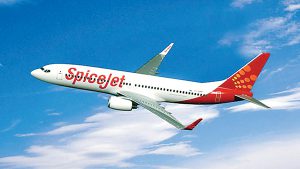Bloomberg
SpiceJet Ltd delivered on its chairman’s word and posted a surprise profit after making losses for seven straight quarters as ebbing Covid-19 cases paved the way for a relaxation in movement curbs and boosted domestic air travel.
India’s third-largest budget airline posted a net income of 232.8 million rupees ($3.1 million) in the three months ended on December 31, according to a statement. A Bloomberg survey of analysts had estimated an average loss of 3.2 billion rupees while the deficit in the same period last year was 569.6 million rupees. Revenue rose 34% to 22.6 billion rupees, beating estimates. Total costs also surged 34% in tandem.
Chairman Ajay Singh in October flagged SpiceJet had a “reasonable chance†of returning to profit in the December quarter as the no-frills carrier recovers from a punishing stretch during the pandemic which gutted global travel. SpiceJet has undertaken cost cuts and renegotiated aircraft leases to prune expenses while it bets on growth of its cargo operations and air travel.
“There are renewed signs of recovery in the passenger segment and the logistics segment continues to remain strong,†Singh said in the post-earnings statement. “The settlement with Boeing was a significant event during the quarter.â€
SpiceJet is seeking to cut liabilities by as much as $300 million over six months and raise funds from banks and potentially a warrants issue, Singh said in November. Boeing Co compensated SpiceJet “both in cash and in kind†for the losses it suffered when the 737 Max jets were grounded, Singh said then.
The airline would like to add another 30-40 passenger aircrafts to its fleet over the next two years, on top of an existing order book that includes 155 Boeing Co 737 Max aircraft, Singh said in October.
The Indian government allowed local airlines to operate at full capacity in October as new infections started declining sharply across the country and vaccination cover continued to rise. While the omicron-led flare up was short-lived in India, any recovery in the sector continues to be at risk if further Covid variants cause a spike in infections. Rival airline IndiGo, India’s biggest carrier, also reported a surprise swing into profit in the same quarter.
SpiceJet, which controls 10.3% of the local market, was overtaken by Go Airlines India Ltd in December as India’s second-largest airline. SpiceJet’s race to reclaim the No. 2 spot will also face stiff competition from Air India Ltd, which is headed for a revamp after Tata Sons formally took over the indebted carrier in January.
 The Gulf Time Newspaper One of the finest business newspapers in the UAE brought to you by our professional writers and editors.
The Gulf Time Newspaper One of the finest business newspapers in the UAE brought to you by our professional writers and editors.
